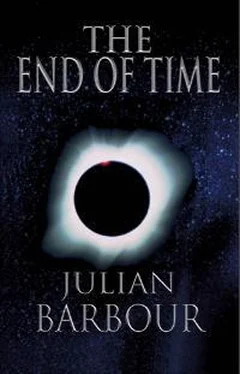The single most striking thing about the universe we see around us is its rich structure, which is so difficult to understand on a priori statistical grounds. Until the modern scientific age, all thinkers saw the first task of science as being the direct description and explanation of this structure. This natural impulse is reflected in the Pythagorean notion of the well-ordered cosmos. It was still very strong in both Kepler and Galileo. However, when Newton demonstrated the supreme importance of accelerations in dynamics, the perspective of science changed, for the world at the present instant became the mere consequence of its initial conditions. Instead of asking directly how structure is fashioned, science turned to asking how it is refashioned.
It seems to me that the abolition of time in quantum gravity must bring us back to a more Pythagorean perspective, though with a quantum slant, for now we must simply ask what structures are probable. It seems to me that the first decisive step in this direction was the discovery by Schrödinger of his time-independent wave equation, with its all-important condition that its solutions must be well behaved, and Born’s probability interpretation of quantum mechanics. For we know that these two basic elements of quantum mechanics work together to bring forth exquisite structures in great profusion, doing so moreover without any boundary or initial conditions and with total disregard for what might seem statistically likely. That is the story of atomic, molecular and solid-state physics. I think it may even be the story of the universe.
NOTES
Soccer in the Matterhorn(p. 307) In the second edition of The Physical Basis of the Direction of Tune , Zeh says that the intrinsic dynamical asymmetry of quantum gravity ‘offers the possibility of deriving an arrow of time (perhaps even without imposing any special conditions)’.
Timeless Descriptions of Dynamics (1)(p. 309) For specialists: for each stage of a perturbation expansion, Mott always chooses a kernel in an integral representation corresponding to outgoing waves. However, nothing in the mathematics rules out the (occasional) choice of incoming waves. This would mess up everything.
(2)(p. 309) I should emphasize that Mott, like Bell, never used any expression like ‘time capsule’, and clearly did not think in such terms about alpha-particle tracks. Neither did Mott’s work on alpha-particle tracks seem to have prompted him to any intimations of a many-worlds type interpretation of quantum mechanics. I learned this from Jim Hartle. Over a decade ago, when collaborating with Stephen Hawking in Cambridge, Jim lodged at his college, Gronville and Caius (featured famously in Chariots of Fire ), which was also Mott’s college. Over dinner Jim asked Mott whether his paper had not led him to anticipate some form of Everett’s idea, and was told no. Apparently, all the ‘young Turks’ followed the Copenhagen line without hesitation at that time. Shortly before his death about two years ago, when he was still mentally very alert, I contact Mott and asked if I could talk to him about his paper. Alas, he was too ill to keep the appointment, telling his secretary he was very disappointed ‘since the man wanted to talk about work I did nearly sixty years ago’.
A Well-Ordered Cosmos?(p. 321) This final section follows closely the final section of Barbour (1994a).
EPILOGUE
Life Without Time
Pied Beauty
Glory be to God for dappled things –
For skies of couple-colour as a brinded cow;
For rose-moles all in stipple upon trout that swim;
Fresh-firecoal chestnut-falls; finches’ wings;
Landscape plotted and pieced – fold, fallow, and plough;
And áll trádes, their gear and tackle and trim.
All things counter, original, spare, strange;
Whatever is fickle, freckled (who knows how?)
With swift, slow; sweet, sour; adazzle, dim;
He fathers-forth whose beauty is past change:
Praise him
It is a pity that Gerard Manley Hopkins’s finest line in this poem implies that creation is a male prerogative and is so inappropriate for the dawning millennium. But what beauty past change the wave function does manage to find in the nooks and crannies of Platonia! What are we to think of life if time and motion are nothing but very well-founded illusions? I have selected a few topics, trying to anticipate some of the questions that the reader, as a human being rather than a scientist, might ask. I also give some hints of how I think the divide between impersonal science and the world of the arts, emotions and religious aspirations might be bridged somewhere in Platonia. I love and respect the disciplines of both. Can they be shown to flow from a common view of the world?
Can We Really Believe in Many Worlds?
The evidence for them is strong. The history of science shows that physicists have tended to be wrong when they have not believed counterintuitive results of good theories. However, despite strong intellectual acceptance of many worlds, I live my life as if it were unique. You might call me a somewhat apologetic ‘many-worlder’! There are occasions when the real existence of other worlds, other outcomes, seems very hard to accept. Soon after I started writing this book, Princess Diana was killed, and Britain – like much of the world – was gripped by a most extraordinary mood. Watching the funeral service live, I did wonder how seriouslyone can take a theory which suggests that she survived the crash in other worlds. Death appears so final.
Such doubts may arise from the extraordinary creative power – whatever it is – that lies behind the world. What we experience in any instant always appears to be embedded in a rich and coherent story. That is what makes it seem unique. I would be reassured if the blue mist did indeed seek out only such stories. Shakespeare wrote many plays, nearly all masterpieces. But we do not even have a unique Hamlet: producers are always cutting different lines, and producing the play in novel ways. Variety is no bad thing: I have enjoyed many outstanding Hamlets . In the timeless many-instants interpretation, they were all other worlds, and that is what makes timeless quantum cosmology fascinating. Our past is just another world. This is the message that quantum mechanics and the deep timeless structure of general relativity seem to be telling us. If you accept that you experienced this morning, that commits you to other worlds. All the instants we have experienced are other worlds, for they are not the one we are in now. Can we then deny the existence of worlds on which ψ collects just as strongly as on our remembered experiences?
Does Free Will Exist?
Anyone committed to science has difficulty with free will. In The Selfish Gene (2nd edition, pp.270-71), Dawkins asks, ‘What on earth do you think you are, if not a robot, albeit a very complicated one?’ From personal introspection, I do not believe that my conscious self exercises free will. Certainly I ponder difficult decisions at length, but the decision itself invariably comes into consciousness from a different, unconscious realm. Brain research confirms that what we think are spontaneous decisions, acts of free will, are prepared in the unconscious mind before we become aware of them.
However, the many-instants interpretation puts an intriguingly different slant on causality, suggesting that it operates in nothing like the way we normally believe it to. In both classical physics and Everett’s original scheme, what happens now is the consequence of the past. But with many instants, each Now ‘competes’ with all other Nows in a timeless beauty contest to win the highest probability. The ability of each Now to ‘resonate’ with the other Nows is what counts. Its chance to exist is determined by what it is in itself. The structure of things is the determining power in a timeless world.
Читать дальше












